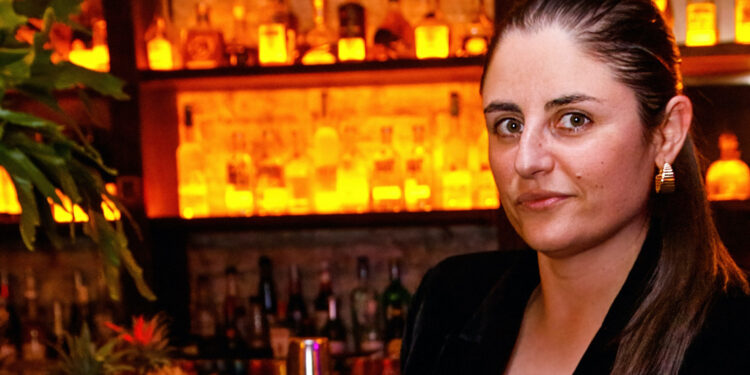South Africa has a thriving music ecosystem, one that crosses borders, genres and audiences. Tecla Ciolfi has been a music journalist for over 15 years, a tough ask in a constantly changing music, audio and media environment.
She hosts an award-winning website, Texx and the City, and has now launched a spin-off podcast devoted to South Africa’s festival scene.
The launch was timeous: just in time for Rocking the Daisies (postponed until mid-November after massive floods in September).
Q: There’s not a lot of ‘beat’ journalism any longer. Too often journos are Jacks and Jills of all trades. How did you come to specialise as a music journalist?
A: The short answer is that I wasn’t really interested in any other kind of journalism. There was something very sexy to me about living a Hunter S. Thompson or Jack Keroauc-esque existence when I was 18 years old. So I channelled a bit of that ‘open road’ mentality into my escapades to festivals or events, and as a result some of my earliest work is still my favourite. But I became a specialist music journalist first and foremost because of my love for music. There’s not a lot of money in journalism, so the passion has to fuel you, otherwise you’re DOA.
Q: What were the obstacles you had to overcome to become successful in this highly competitive field?
A: The world is a very different place now; I had to put up with a multitude of different comments, slurs and actions that today no one would stand for. But as challenging as that was, it shaped me into the total badass that I am today. I’ve also equipped myself with the tools to identify when a situation is not for me – be it business or social. I think it’s always good to know when something isn’t healthy for you, and when you should rather walk away instead of flogging a dead horse. I re-learnt that lesson a year ago, actually. It’s taken me a while, but I finally know my worth.
Q: Having been at it for 15 years, you witnessed enormous changes in the music industry, and in the publications covering music. Rolling Stone SA went under, for instance. How did you pivot your career in these new directions?
A: I learnt pretty quickly how to adapt or die; it sounds super dramatic, but it’s true. If you’re closed off and narrow-minded, you’re never going to survive in this industry. Texx and the City embraced the changing music scene by focusing on multiple genres, not just the alternative genres we covered on launch. By doing that, we widened our scope and broadened our audience; it keeps things fresh and interesting for us as a team, and from a content perspective.
Q: How would an ambitious youngster now tread the path to becoming a music journalist? What would you say to your younger self, or aspirants?
A: I was fortunate in the fact that I managed to marry what I was studying at UCT (BA in English) with my love for music, and what was happening on the local music scene. You have to have that love, that passion – it’s non-negotiable – but you don’t need to have a tertiary education. There are loads of resources available on the internet for you to teach yourself how to write. I would suggest immersing yourself into the world of music journalism – read everything, watch everything… I’d tell my younger self to hang in there; it’s going to be one hell of a ride.
Q: Were you a child who grew up listening to South African music?
A: No one’s ever asked me this question before, but yes! There was this show on e.tv in the morning called The Toasty Show. I loved it! They’d have different musical guests on each show, everything from pop to rock to hip-hop to kwaito, and I remember really enjoying the hip-hop guests because it was something I’d never heard before. I grew up on very specific rock and pop, and I remember loving the swagger of hip-hop.
5FM was also a phenomenal radio station in the early ’00s for championing South African music. I look at those years as the golden ones for alternative music on radio. I learnt so much from those DJs, their shows were highly educational from a journalism standpoint.
Q: How well marketed is South African music?
A: I feel like the media that’s left is more interested in covering who a musician is dating or what they’ve tweeted, as opposed to whether or not their new album is any good. I believe if the media changed its questioning and approach to how they covered South African music it would change the trajectory of music marketing. There would be something for the musician to aspire to. Certain genres of local music are not very well-marketed, which is why our musos have become masters in the art of self-promotion. They’ve utilised social media and streaming platforms to their benefit, and sometimes to launch and manage a whole career.
Q: What more should we be doing?
A: We can only do so much at a grassroots level. Covid-19 really put things into perspective as to how many of our musos are struggling financially, and there has to be more government intervention in terms of investment in our next generation of musicians, but also in the next generation of journalists and creators. I feel like big brands have really gotten involved in huge cultural moments – like amapiano – where our government has failed.
Q: Who is doing it right? Who are the best music/band marketers in the business?
A: Hmmm. There are a few independent companies that do a great job marketing releases, but many of them still haven’t stepped into the age of new media and aren’t utilising new marketing tools.
As for musicians, I don’t think anyone is doing self-marketing better than Will Linley. The man built an entire career off the back of a viral Tik Tok video, and the way that he’s capitalised on that is genius.
Q: How did your podcast journey roll out during Covid-19?
A: I recorded the first season of my podcast pre-Covid, and released it as we went into lockdown. I didn’t foresee it being a giant success, as I had to navigate how to record from home, and then release and market the podcast differently for the second season. It really was the right place, at the right time for Texx Talks, and the podcast ran for 10 solid seasons before I took a break for a year to go and study at Chef’s School – more on that, some other time.
I rebranded and relaunched my original podcast under Texx and the City: The Podcast because I wanted a fresh start and the ability to explore other narrative avenues. The original podcast was interview-driven, and the possibilities with Texx and the City: The Podcast are endless, but I knew I wanted to take it on the road. This is why the new season focus on Rocking the Daisies excites me, because I’m interviewing musicians, yes, but I’ll also be at the festival chatting to people to get a unique festival experience.
I’d like to add: rebranding is not necessarily the worst thing in the world, everything needs a facelift every now and then, and it might open up a world of possibility for you.
Q: How are you monetising it and what has the response been, from an audience and commercial perspective?
A: I’ve never sold traditional advertising; I prefer to go into partnerships with brands and collaborate on a season. Rocking The Daisies have been the perfect partners to collaborate with, and Steyn Entertainment and Rocking the Daisies’ GM, Shannon Valstar, is always keen to listen to my crazy ideas and brainstorm how to turn it into reality.
Q: Finally, what’s your take on music/artist podcasts in South Africa?
A: I’m actually surprised that there aren’t more music-focused podcasts in South Africa, podcasts that are focused solely on dissecting and debating the music. The few interview-based podcasts that there are, are good, but we’re in dire need of more.














